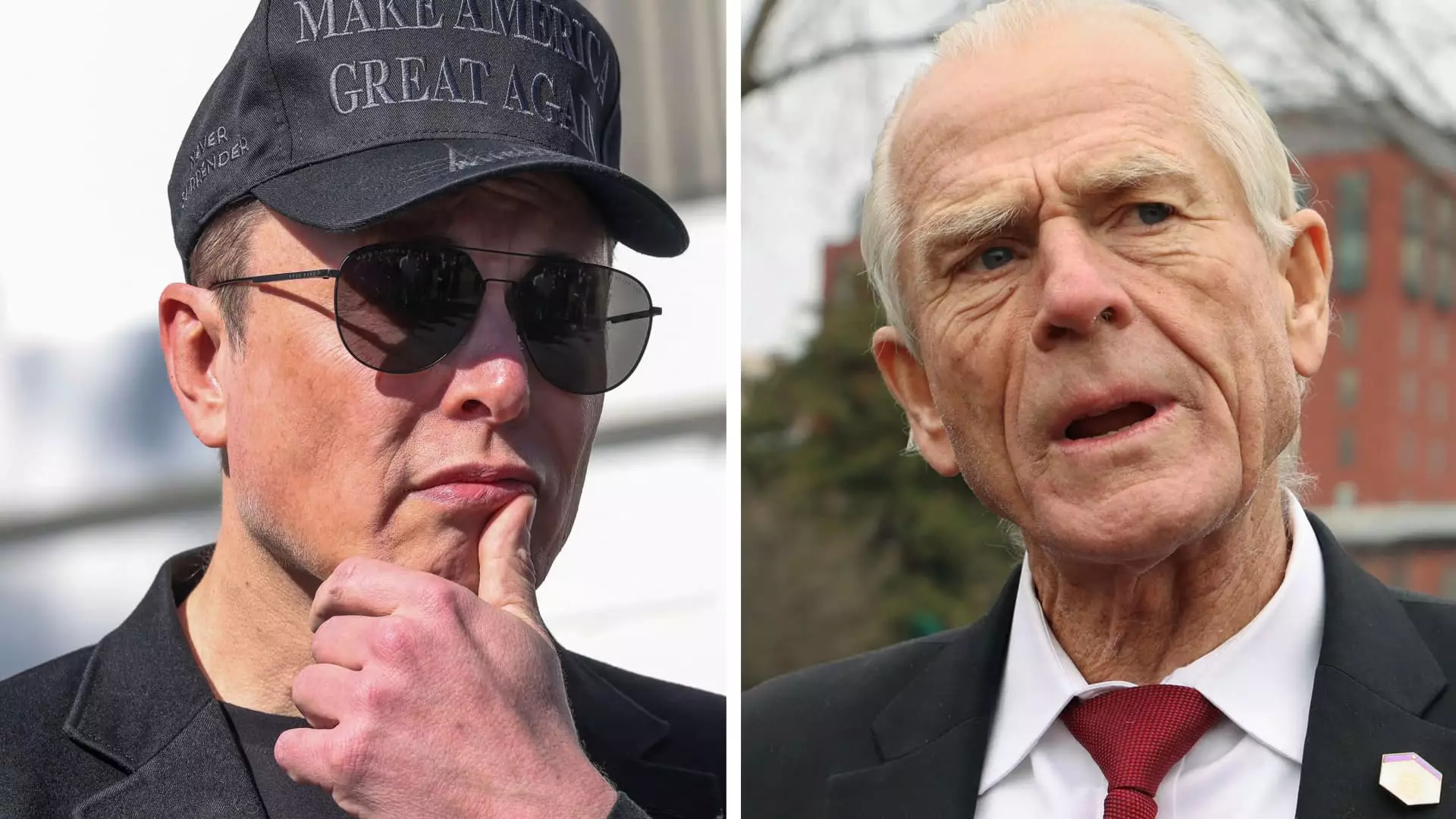In an extraordinary display of public vitriol, Tesla CEO Elon Musk has found himself in an escalating feud with Peter Navarro, a key economic advisor to former President Donald Trump. This feud surfaced amid a significant downturn in Tesla’s stock, which has slumped dramatically by over 20% in just four trading days. Stocks often react sensitively to broader political climates, and Musk’s explosive comments hint at a complex interplay between corporate performance and political policies. With Musk’s fortune shrinking by approximately $585 billion since the beginning of the year, it’s evident that the economic environment is becoming as tumultuous as the chaos unfolding on social media.
Musk resorted to social media platform X to publicly ridicule Navarro, sparking speculation about the stress investors face amidst the turmoil. His remarks, calling Navarro “truly a moron” and “dumber than a sack of bricks,” were not merely blustering invective; they signaled the frustration of a billionaire watching his empire unravel, prompting observers to wonder whether this outburst was a desperate call for the administration to reconsider its heavy-handed tariff policies.
A Clash of Economic Philosophies
Navarro’s commentary describing Tesla as simply a “car assembler” played into a larger discourse on trade and production. Musk, staunchly defending his company, labeled Navarro’s comments as “demonstrably false,” hinting that a broader misunderstanding exists about the high-tech automotive manufacturing sector. This divide highlights a significant rift within Trump’s economic team, as Musk’s views on tariffs sharply contradict the protectionist stance taken by Navarro and others in Trump’s inner circle.
The ramifications of these tariffs reach far beyond Tesla. While analysts initially believed Tesla could weather these tariffs due to its domestic assembly lines, the reality is more complex. The imposition of tariffs on materials and parts sourced from Canada, Mexico, and even China could drive up production costs significantly. Musk’s fervent advocacy for zero tariffs between Europe and North America reveals not only his strategic interests but also the challenges that U.S. manufacturers face in an increasingly interdependent global market.
The Political Dimension to Business Decisions
Musk’s politically charged comments reflect the broader tensions between corporate interests and governmental policies. His dual role as a leading entrepreneur and an influencer on political policy complicates this narrative. The public sparring involving the likes of Musk and Navarro exposes the vulnerabilities of businesses reliant on international supply chains and the inherent risks posed by sudden shifts in trade policy.
At a recent event in Italy, Musk articulated a desire for a collaborative economic future, proclaiming that a free trade zone between Europe and North America should be the ideal objective. This sentiment starkly contrasts with Trump-era policies, under which tariffs have been imposed not just on automobiles but also on various components essential to the production processes, thereby threatening to stifle innovation and competitiveness.
Market Reactions and Societal Impacts
The unfolding saga with the stock market has broader implications for the societal perception of Tesla and its leadership. In recent months, the company has dealt with significant challenges, including a 13% year-over-year decline in first-quarter deliveries and public backlash driven by Musk’s controversial political commentary. As protests and boycotts emerge against the backdrop of his political aspirations, it becomes evident that Musk is navigating a treacherous landscape where his personal viewpoints and business interests intersect in unpredictable ways.
Moreover, as Tesla grapples with production shortages and logistic inefficiencies exacerbated by governmental policies, Musk’s outbursts may not only jeopardize investor confidence but also distract from the fundamental operational challenges the company faces. With the automotive market undergoing rapid transformations and sustainability being a focal point, it’s imperative to rally stakeholder support instead of inviting divisive rhetoric into corporate circles.
The tumultuous relationship between business and politics, exemplified by Musk’s backlash against Navarro, underscores a vital truth: in today’s economic landscape, clarity, coherence, and mutual understanding are as important for success as technological innovation and consumer trust. The unfolding drama serves as both a caution and a lesson about the interconnectedness of global economies, the criticality of strategic diplomacy, and the havoc that can arise when personal egos and public policies clash.


Leave a Reply